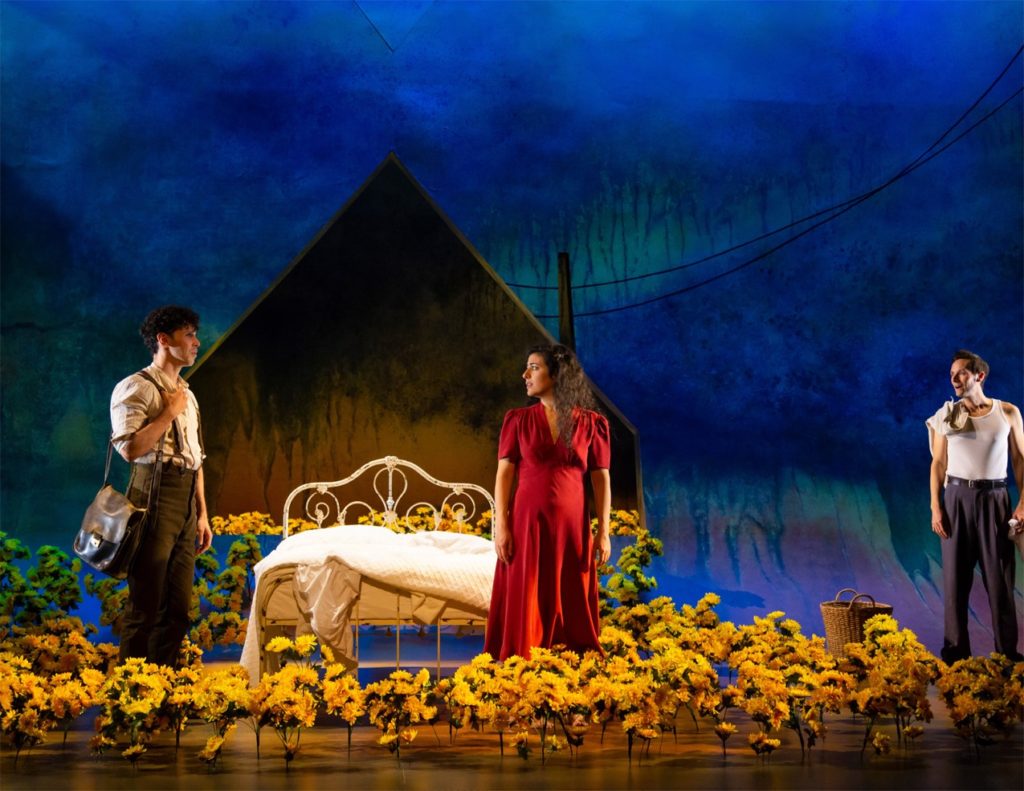Yerma: A Play About a Woman’s Desperate Need to Have a Baby

Lorca’s tragedy “Yerma” written in 1934 is rarely performed in the United States, although in Spain where Lorca is considered one of the country’s most important playwrights, his works are frequently played. However, in the last two years in the US there have been at least two important professional productions. The first was a rewritten, updated version developed in England and brought to New York in 2018 where it won over critics and audiences. The second, now playing at Calderwood Pavilion, was developed in Boston at the Huntington Theatre Company and adapted and translated by Melinda Lopez their playwright in residence. On press night Lopez played Dolores since Jacqui Parker the actress who had the role was injured.
In Act I, scene 1 women are heard singing off stage as the sun rises. Yerma (Nadine Malouf) and her husband Juan (Christian Barillas) are making love blissfully. Yerma sings a lullaby to the son she does not have. (Lorca drew his protagonist’s name from a masculine Spanish noun “yermo” which signifies wasteland.) Although Juan claims to love her and says he wants a baby, his main interest is making money from his farm. Yerma tells him she is “late” meaning her period has not arrived. Juan appears pleased.
Yerma says that unlike other girls who cried with fear before their husbands slept with them, she sang with joy. They have been married twenty-four months and she now believes she is pregnant. Juan tells her that he is not going to share the news with anyone until they are sure. Yerma babies her husband, trying to get him to eat before he leaves for work.
Juan exits to labor on his land and Yerma sings to the baby she thinks she is carrying. Her friend Maria (Marianna Bassham) arrives her arms filled with packages. She went shopping because she discovered she is pregnant. Unlike Yerma, Maria has been married only a short time. She is still so young that she is embarrassed because the townspeople will know she had sex. Yerma confides that she too is carrying a baby. Still unsure Yerma decides not to tell anyone else until she has definitive proof.
Maria leaves and Yerma sings. Victor (Ernie Pruneda), an old friend with whom she was infatuated when she was younger, enters. Unable to keep her secret to herself, she lets him know she is pregnant. Yerma leaves the house to bring Juan his lunch. Village women are doing their wash at the edge of the river.
As she walks a woman called Incarnacion (Alma Cuervo), the mother of nine sons, is not convinced that Yerma is pregnant. She encourages Yerma to take a lover who resembles Juan so that her husband won’t realize the child is not his.
Yerma meets Marta (Evelyn Howe) who is dissatisfied with the lack of life choices for women. Marta’s mother Dolores aids women. That is she helps them get pregnant if that is what they want or she helps them miscarry if that is their wish.
Victor is heard crooning about a lonely life. The two of them sing about nature. Victor believes her husband Juan is even sadder than Yerma. She responds that Juan is a “dry kind of person,” someone who takes little pleasure in anything. The two begin to flirt as Juan enters. After Victor leaves Juan tells her he would like to see her spending time with other women.
Juan is passing the night procuring water since the sluice gates are going to be opened. Because of the lack of water, the crops are endangered. Yerma’s goal is to have a baby; Juan’s to have a successful farm. The two needs overlap.
As the years go by she becomes the source of gossip for the other women in the town who accuse her of acts she has never performed. Juan directs his two unmarried sisters to watch her. Yerma has almost no freedom. But freedom was never hers. Her father chose Juan as her husband. She still dreams of having a baby although ten years have passed since she thought she was pregnant. Her relationship with Juan has deteriorated.
In desperation she visits Dolores who performs a rite over her aided by several other women. Dolores instructs Yerma to seduce her husband that night, but Yerma is no longer attracted by him. However, she decides to go home having promised herself she will do “whatever it takes.” As she leaves she finds Juan at the door. He accuses her of having lovers. She is furious that he thinks she has been unfaithful. Her honor is as important to her as his is to him. We discover that Juan, although a failure as a husband, has loved her.
The play is an interesting piece of history which reveals the life of a small town in Southern Spain when it was still very religious, at least theoretically, and women had few, if any rights. Lorca wrote two other tragedies: “Blood Wedding” in 1930 and “The House of Bernarda Alba” in 1936, the same year he was killed during the Spanish Civil War. “Bernarda Alba” was first performed in 1945 in Buenas Aires
The music which makes use of flamenco in true Lorca style was composed by Mark Bennett and is played by guitarist Juanito Pascual and percussionist Fabio Pirozzolo. Cameron Anderson’s nonrealistic set which focusses mainly on the couple’s wedding bed and the yellow flowers surrounding it works well.
Nadine Malouf and Christian Barillas are believable as the couple who despite their attraction to each other destroy their relationship and their lives.
“Yerma” plays approximately one hour and twenty-five minutes with no intermission.
Yerma runs through June 30 at the Calderwood Pavilion at the Boston Center for the Arts. 527 Tremont Street, Boston, MA 02116.